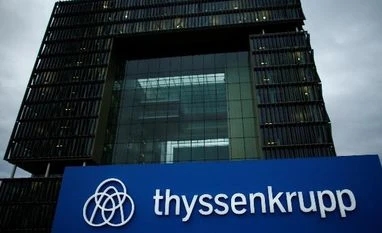Thyssenkrupp and India's Tata Steel are trying to hammer out the final details of a European steel joint venture which could decide the future of the German firm's Chief Executive Heinrich Hiesinger.
The two firms are seeking to adjust the terms of the deal to compensate for a valuation gap which has emerged since a preliminary agreement in September, facing a self-imposed June deadline which has become a make-or-break moment for Hiesinger.
He is under intense pressure from activist shareholders Cevian and Elliott, which have accumulated a combined holding of about a fifth of Thyssenkrupp's shares.
The complex negotiations also need to satisfy several other influential stakeholders, all with different agendas. If the final deal with Tata Steel fails to convince investors, Hiesinger would face calls to step down.
Below are four possible scenarios:
PRESSURE PILES ON HIESINGER AFTER 'COSMETIC FIX'
More From This Section
PROBABILITY: HIGH
Investors fear that Hiesinger might sacrifice the perfect deal to reach a self-imposed end-June deadline, eager to deliver after more than two years of talks which have left shareholders, most notably Cevian, impatient.
Elliott says that the value gap between the European steel assets is 1.9 billion euros ($2.2 billion), while Goldman Sachs, which advises Thyssenkrupp, estimates it to have reached hundreds of millions of euros, sources say.
Regardless of which solution Hiesinger presents, it will be tough to convince influential labour leaders and key shareholders, who fear that Tata Steel's weakening performance could mean Thyssenkrupp getting the short end of the stick.
"There is fear of a cosmetic fix," one shareholder said, adding this could include a low-ball cash payment from Tata Steel to Thyssenkrupp or excluding Tata Steel from dividends from the venture for a set number of years.
Hiesinger would then be more vulnerable to investor criticism, which has mounted in recent months over a 25 percent share price fall since he became CEO more than seven years ago.
FURTHER DELAY
PROBABILITY: MEDIUM
The signing of the deal has already been delayed once, "which is an indication of the complexity of the deal and the need to agree plans with all key stakeholders including trade unions and workers", Moody's said in a note this week.
Hiesinger, however, wants to put an end to the lengthy negotiations and get the supervisory board, half of which is controlled by labour representatives, to agree to it, arguing it puts the steel business on more stable footing.
Investors see no need to force through a deal by the end of next week, arguing it would be better to take more time and get a better outcome for Thyssenkrupp. "A few more weeks would not be a problem at this stage," another shareholder said.
HIESINGER KEEPS EVERYBODY HAPPY
PROBABILITY: LOW
Hiesinger could buy time with a renegotiated deal which closes the valuation gap in a way which is acceptable to activist investors. Divesting assets or loading up the joint venture with more debt could achieve this, even if Thyssenkrupp's labour representatives would balk at it.
Plugging the valuation difference also depends on whether Tata Steel is willing to transfer significantly fewer liabilities to the joint venture than the 2.5 billion euros planned so far, or accept another adjustment.
Tata Steel, plagued by operational issues at its European activities, is under pressure itself and needs the deal to fix its struggling Port Talbot factory in Britain, by far the least profitable asset in the proposed combined entity.
Loading more debt on the venture, changing the ownership structure and excluding dividends from Tata Steel for a fixed period are all options on the table, sources say.
NO DEAL BETTER THAN BAD DEAL
PROBABILITY: LOW
A collapse of the deal would be a disaster for Hiesinger and his vision of transforming the steel-to-submarines conglomerate into a tech company focused on elevators and car parts.
Consent is far from certain, with support of labour representatives not guaranteed in light of ongoing scepticism over whether the deal is fair to workers.
However, the backlash could be limited, with key investors arguing that no deal would still be better than a bad deal, also citing the fact that Thyssenkrupp's steel business is performing well at the moment.
"If there are new numbers and fresh doubt at the end of a process, you should stop the process," a senior industry banker said. "That would be a sign of strength, not weakness."
)